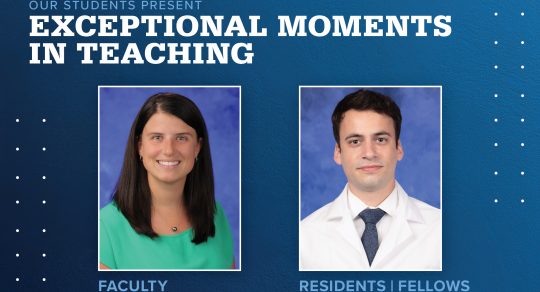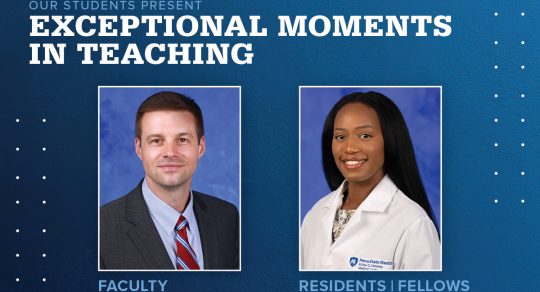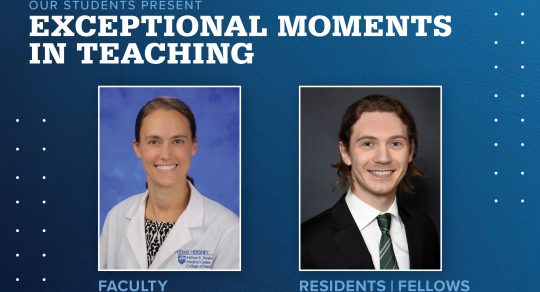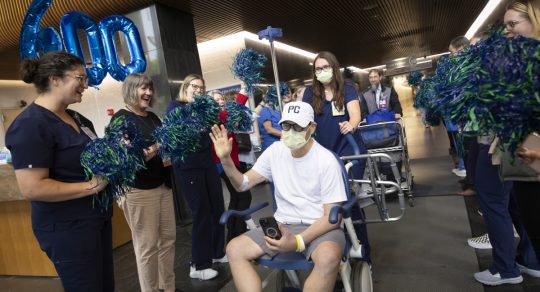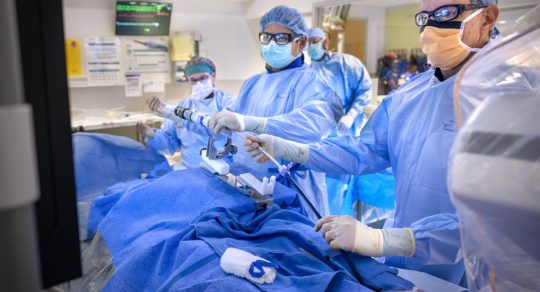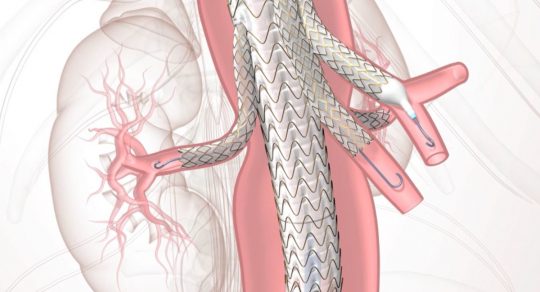Residency
Vascular Surgery
The Vascular Surgery Residency at Penn State Health Milton S. Hershey Medical Center is a five-year, ACGME-accredited integrated program (mixing general surgery and vascular surgery through the first four years) that admits one resident per year.
On This Page
The Division of Vascular Surgery at Penn State Health Milton S. Hershey Medical Center has a long history of training vascular surgery fellows. The institution was approved by RRC for an integrated vascular surgery residency in 2009, and its first integrated vascular surgery resident graduated in 2016.

Program Overview
The five-year comprehensive clinical training program in vascular and endovascular surgery matches medical students directly into vascular training. General surgery and vascular surgery are incorporated over the five years.
The program is based at Penn State Health Milton S. Hershey Medical Center, with electives available to rotate with division faculty at Mount Nittany Medical Center. A complete schedule of didactic sessions and clinical conferences supplements the patient care and research activities of the Vascular Surgery Service.
The clinical expertise of the division includes all components of the diagnosis and treatment of vascular disorders. Patients with a wide variety of arterial, venous and lymphatic diseases receive evaluation from a whole-patient perspective. The surgical faculty employ numerous methods and technologies for vascular reconstruction in patients requiring invasive therapy, and offer medical management for those with milder forms of disease. The entire spectrum of endovascular therapy is provided through the integrated framework of Penn State Heart and Vascular Institute. The Division of Vascular Surgery provides non-invasive vascular testing as an integral part of patient management, and is both nationally and internationally recognized for its excellence.
The academic mission of the division embraces scholarship in both clinical and related basic sciences. The Vascular Surgery Residency trainees have the opportunity to pursue research work that has led to presentation and publication of their work at regional and national conferences. The division participates in major national clinical trials and is active at all levels in developing quality standards for noninvasive testing.
Learn More about the Residency
General Application Information
Penn State College of Medicine is a participant in ERAS and the National Residency Matching Program (NRMP) Match. All application material must be submitted through ERAS. Applications will not be received outside of ERAS. All candidates will need to be registered with the NRMP; no positions will be offered outside of the match.
Application deadline is Oct. 4. Applicants are invited to check the status of applications by email through MyERAS. All email correspondence regarding applications should be conducted through MyERAS to avoid delays.
Applicants with suitable qualifications will be invited to interview and visit with the department.
Application Requirements
Applications will be reviewed in their entirety.
U.S. clinical experience is not required; however, vascular surgery electives and/or vascular surgery experience is preferred.
The recruitment team prefers to see graduation from medical school within five years of submitting the ERAS application. However, this is dependent upon what clinical/research experience applicants have had since graduating from medical school.
USMLE Step 1/COMLEX 1 is required to be selected for an interview. Step 2 is not absolutely essential to be selected for an interview, but is required to be ranked by the program. USMLE scores should be no less than 190, or COMLEX no less than 500 for osteopathic graduates). Osteopathic graduates are encouraged to take USMLE Step 1. PGY-1 must take USMLE Step 3 before completing the intern year.
There is no official limit for attempting Step 1 or Step 2; however, the number of times the applicant has taken the exam may impact the application. An invitation to interview will be based on the entire application and not simply exam scores.
Three letters of recommendation are required, with one from a vascular surgeon; a dean’s letter, medical school transcripts, curriculum vitae and personal statement are also required.
ECFMG certification must be supplied before beginning as a resident.
The institution currently accepts residents on J-1 visas only; however, the application process and applicable fees are the responsibility of the applicant.
Couples Matches
For applicants who have been invited to interview and who are couples matching with an applicant interviewing with another department at Penn State Health Milton S. Hershey Medical Center, the Vascular Surgery Residency will be happy to help coordinate with the other department as much as possible. Such applicants should .
Interview Process
The program typically interviews 30 to 35 individuals each year over three interview dates between October and January. The interview process is designed to put the applicant at ease and provide detailed information about the program.
All interviews and social events for the 2023-2024 academic year will be conducted virtually through Microsoft Teams.
Leadership

Professor and Gilbert and Elsie H. Sealfon Faculty Fellow in Vascular Research and Treatment, Surgery

Program Coordinator, Vascular Surgery Residency, Surgery
Supporting Your Training
Curriculum Details
Teaching Methods
Teaching in the Vascular Surgery Residency is performed using the following teaching methods:
Mandatory conferences
Mandatory rotation in an attending's office once per week
Direct teaching in the operating room and during patient care.
Assessment Methods for Residents
Verbal feedback during daily rounds and walk rounds
Written self-evaluation twice a year
Written evaluation by physician assistants at conclusion of rotation
Written evaluation by faculty at conclusion of rotation
Written evaluation by nurses twice a year
Written evaluation by inpatients and outpatients once a month
Program Evaluation Assessment Methods
Written evaluation at completion of each rotation
Written evaluation of the program at the completion of each year
Performance on VSITE examination (yearly)
Level of Supervision
The nighttime and weekend attending call schedule is available to all through SmartWeb and the vascular surgery office. An attending is designated to be the rounder each weekday. The rounder is responsible for all daytime and intra-operative consults and transfers.
Training Includes
Fluoroscopy training program
Advanced Trauma Life Support (ATLS)
Advanced Cardiac Life Support (ACLS)
Annual CME funds
Travel opportunities
Leads and loupes
Educational Resources
American College of Surgeons Fundamentals of Surgery Curriculum
Anatomic Exposures in Vascular Surgery
Fundamentals of Vascular and Endovascular Simulator
Rutherford Vascular Surgery
Surgical Council on Resident Education (SCORE)
Vascular Surgery Surgical Council on Resident Education (VSCORE)
The Vascular Surgery Residency (integrated 0/5 program) rotation schedule includes:
PGY-1
Anesthesia/cardiology
Cardiothoracic (CT) surgery
Heart and vascular intensive care unit
Night float
Plastic surgery
Surgical intensive care unit
Trauma
Vascular surgery
PGY-2
General surgery (UPMC Pinnacle)
Heart and vascular intensive care unit
Plastic surgery
Surgical intensive care unit/anesthesia
Thoracic surgery
Trauma
Vascular surgery
PGY-3
General surgery (UPMC Pinnacle)
Interventional radiology
Surgical intensive care unit
Thoracic surgery
Vascular surgery
Vascular surgery (Mount Nittany)
Vascular surgery (UPMC Pinnacle)
PGY-4
Interventional radiology
Vascular surgery
Vascular surgery (Mount Nittany)
Vascular surgery (UPMC Pinnacle)
PGY-5
Vascular surgery
Vascular surgery (Mount Nittany)
Tuesday
7 to 8 a.m. the second Thursday of each month: Heart and Vascular Institute basic science lecture
Thursday
7 to 8 a.m. weekly: General surgery education lectures
7 to 8 a.m. weekly: Vascular preoperative conference and Morbidity and Mortality
7 to 8 a.m. quarterly: Office of Graduate Medical Education
8 to 9 a.m. weekly: Vascular teaching conference
9 to 10 a.m. weekly: Vascular skills, CBL, Journal Club and interesting articles
There are also surgical and Heart and Vascular Institute grand rounds, along with surgery Morbidity and Mortality.
Vascular Teaching Conference
Bi-annual cadaver and simulation lab
Vascular science didactic lab
Varied lectures by residents, fellows and faculty members
General Surgery Education and Training
Topics and location are assigned weekly
PGY-1 through PGY-3 residents are required to attend these sessions if deemed relevant by the Assistant Program Director
If sessions are not relevant, vascular skills, case-based learning or sessions in the Vascular Lab will be assigned
Attendance Requirements
Residents on vacation are excused from all conferences. Other than this exception or other extenuating circumstances previously approved by the program director and reported to the program coordinator, residents are expected to attend all conferences. If at an off-site rotation, residents must use a Microsoft Teams meeting link to sign in to the vascular teaching conference, vascular preoperative conference and Morbidity and Mortality. Residents must participate in 75 percent of all required conferences.
Resident Honors and Recognitions
Penn State College of Medicine and Penn State Health Milton S. Hershey Medical Center accept ongoing nominations for the Exceptional Moments in Teaching award.
The award, given monthly by the Office for a Respectful Learning Environment, accepts nominations from College of Medicine students who are invited to submit narratives about faculty members, residents, fellows, nurses or any other educators who challenge them and provide an exceptional learning experience. .
Previous nominees from the Vascular Surgery Residency are listed here.
The annual Resident/Fellow Research Day is held each year (with exception of during the COVID-19 pandemic) on and around the Penn State Health Milton S. Hershey Medical Center campus.
The intent of the event is to provide an opportunity for residents and fellows to showcase their research accomplishments to their peers in other clinical departments, as well as their colleagues in the basic sciences.
.
Previous presentations from the Vascular Surgery Residency are listed here.
Contact Information
Mailing Address
Penn State Health Milton S. Hershey Medical
Center Division of Vascular Surgery
P.O. Box 850, MC H053
Hershey, PA
17033-0850
General Contact Information
Phone: 717-531-8898
Fax: 717-531-4151
